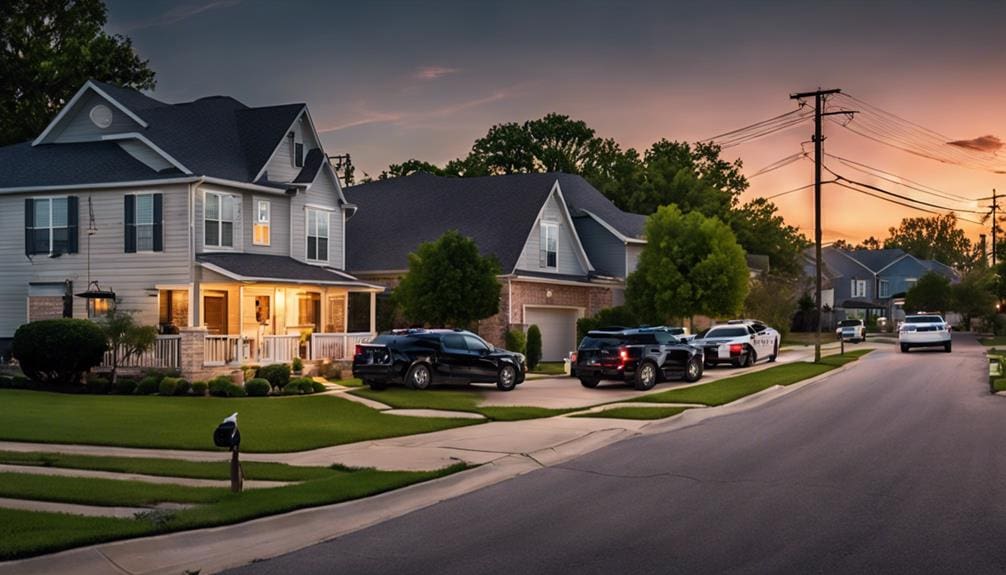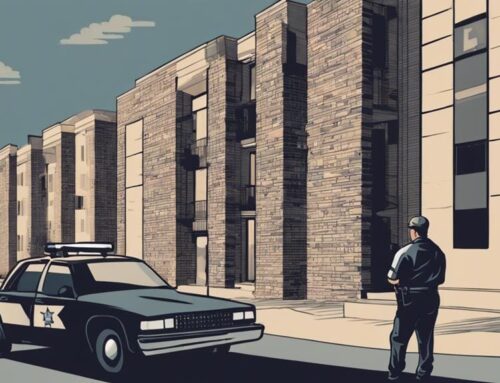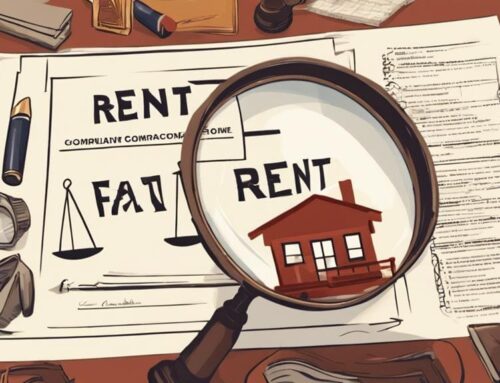Texas has strict residential property crime laws to deter potential criminals and protect homeowners. Offenders face harsh penalties, including hefty fines and lengthy jail time, discouraging them from targeting homes. These laws guarantee justice is served and uphold property rights, privacy, and security. Categorizing crimes as misdemeanors or felonies helps maintain a safe and secure community environment by reducing theft, vandalism, and unauthorized entry. Law enforcement’s proactive measures and community outreach further support these strict regulations. If you’re interested, there’s more to discover about the effectiveness and nuances of these laws.
Key Takeaways
- Texas laws impose severe penalties to deter potential criminals from targeting residential properties.
- Harsh legal consequences ensure justice and provide protection for homeowners’ property rights and privacy.
- Strict laws promote community safety by reducing incidents of property crimes like burglary and vandalism.
- Law enforcement’s proactive approach with routine patrols and community outreach helps prevent criminal activities.
- Aggravating factors in crimes lead to escalated charges, further discouraging criminal behavior.
Deterrence of Criminal Activities
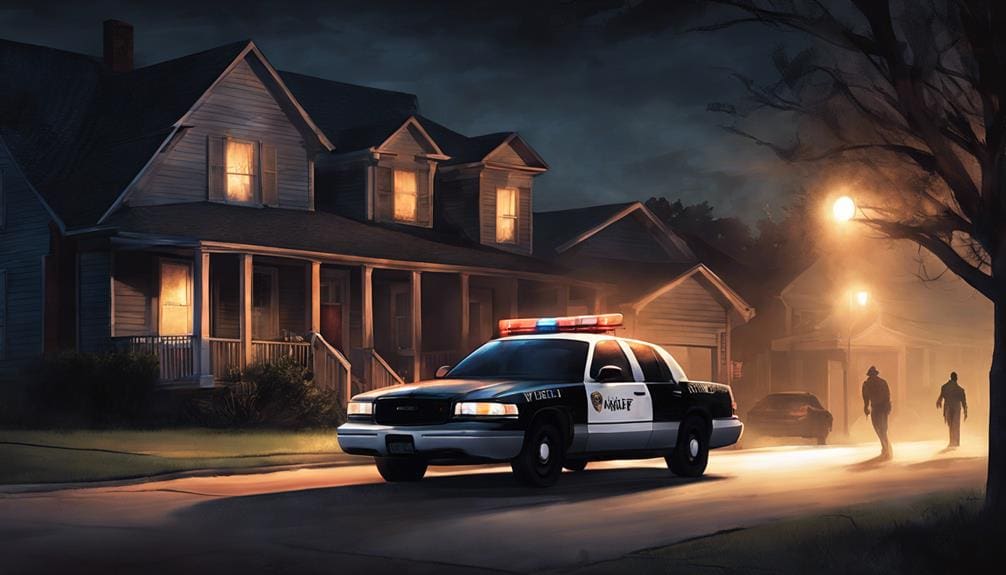
Texas’s strict residential property crime laws aim to deter criminal activities by imposing harsh penalties on offenders. These laws are designed to address various offenses such as burglary, criminal mischief, and arson, ensuring that potential criminals think twice before targeting residential properties.
The strict enforcement of these property crime laws in Texas serves as a robust deterrence mechanism, making it clear that criminal behavior will be met with severe consequences.
By implementing stringent penalties, Texas seeks to create a safer environment for its residents. When you know that the law won’t tolerate illegal actions against homeowners, it fosters a sense of security and community well-being. The state’s rigorous approach to combating property crimes isn’t just about punishment; it’s about maintaining the integrity and safety of residential areas.
The effectiveness of these property crime laws lies in their ability to send a strong message: any form of residential crime, whether it’s burglary or arson, will be met with strict enforcement and significant penalties. This proactive stance plays an essential role in reducing the incidence of property crimes and promoting a safer, more secure living environment for all residents.
Protection of Homeowners

By enforcing strict residential property crime laws, homeowners in Texas gain strong protection against theft, vandalism, and trespassing. These laws don’t just safeguard your property; they also uphold your rights to privacy and security. When your home is secure, you can feel a greater sense of belonging and community, knowing that your neighbors are similarly protected.
The accountability these laws impose on criminals is vital. When someone attempts to violate your property rights, they face serious consequences, ensuring that justice is served. This not only helps you feel secure but also deters potential offenders from targeting your home. The strictness of these laws means that offenders are less likely to risk committing theft or vandalism, knowing that the penalties are severe.
Moreover, maintaining a safe and secure neighborhood is a collective effort. When property crime laws are strictly enforced, everyone benefits. You can trust that your community is taking active steps to protect your shared environment. This collective sense of security reinforces the importance of these laws and encourages a culture of mutual respect and vigilance.
Essentially, Texas’ residential property crime laws provide a solid foundation for a secure and harmonious living environment.
Legal Consequences

Understanding the legal consequences of violating Texas residential property crime laws is essential for both deterrence and enforcement. Texas law categorizes residential property crimes based on the severity of the offense, leading to either misdemeanor or felony charges.
For minor property crimes, you might face misdemeanor charges, which can result in fines up to $4,000 and jail time up to one year. However, more severe offenses could lead to felony charges, bringing penalties that include fines ranging from $5,000 to $10,000 and jail time from two years to life in prison.
The penalties don’t just stop at fines and jail time. You might also have a criminal record, be required to pay restitution to victims, and risk losing professional licenses. Aggravating factors such as violence or the use of weapons during the commission of a property crime can escalate the charges, leading to even harsher penalties.
These stringent legal consequences underscore the gravity with which Texas law treats residential property crime, aiming to protect homeowners and deter potential offenders. By understanding these repercussions, you can grasp why Texas maintains such rigorous standards in its property crime laws.
Community Safety

The stringent legal consequences for residential property crimes not only serve as a deterrent but also play an important role in ensuring community safety. Texas residential property crime laws are crafted to deter criminal activities, such as theft and vandalism, that can disrupt neighborhood tranquility. By enforcing strict penalties for property offenses, Texas authorities aim to safeguard communities and promote a sense of security among residents.
Strict enforcement of these laws helps reduce incidents of property damage, theft, and unauthorized entry into homes. When potential offenders understand the severe repercussions of their actions, they’re less likely to engage in criminal activities. This deterrence is vital in maintaining a secure environment for homeowners and tenants alike.
Community safety is a top priority in Texas, and stringent penalties for violating residential property laws reflect this commitment. By upholding these laws, Texas authorities work diligently to protect the integrity and safety of neighborhoods. Residents can feel a sense of belonging and security, knowing that their community is actively safeguarded against property crimes.
Ultimately, these measures foster a safer, more connected community where everyone can thrive without fear of property offenses.
Role of Law Enforcement
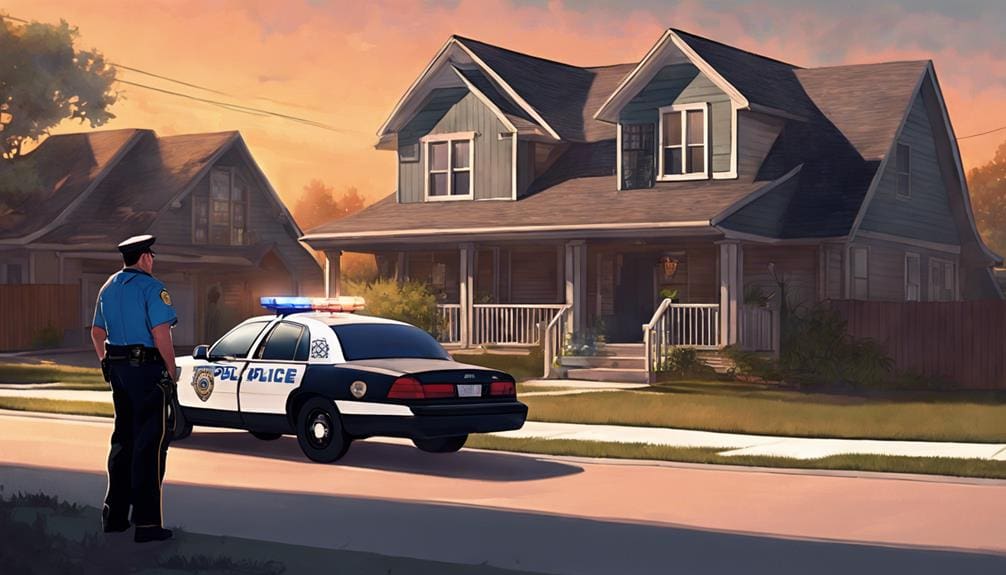
Law enforcement in Texas plays an essential role in enforcing residential property crime laws to safeguard the safety and security of neighborhoods. Officers diligently investigate property crimes such as burglary, theft, and vandalism to protect homeowners and residents. They employ a proactive approach, utilizing routine patrols to deter criminal activities and swiftly respond to incidents of criminal mischief.
By maintaining a visible presence, law enforcement deters potential offenders and reassures the community. Additionally, community outreach programs are integral to their strategy. These initiatives foster collaboration between law enforcement and residents, creating a united front against property crimes. Through educational workshops and neighborhood watch programs, officers educate the public on preventive measures and encourage reporting suspicious activities.
Strict enforcement of property crime laws in Texas is vital in reducing the frequency and impact of these offenses. When law enforcement and communities work together, they create a resilient environment where crime is less likely to flourish.
The dedication of Texas law enforcement to both patrols and community outreach ensures a thorough approach to tackling residential property crimes, ultimately enhancing the quality of life for all residents.
Frequently Asked Questions
Why Is Texas Hard on Crime?
Texas is hard on crime to uphold public order and deter criminal behavior. The state’s tough policies reflect a commitment to safety and justice, aiming to protect communities from various offenses.
With high crime rates, strict laws serve as a deterrent and guarantee that offenders face significant consequences. This approach helps Texans feel secure and reinforces a sense of belonging within their communities.
Why Is the Crime Rate so High in Texas?
You might wonder why the crime rate is so high in Texas. Factors like population size, economic disparities, and urbanization contribute notably.
Texas has large metropolitan areas where crime can be more prevalent. Additionally, economic inequality can drive individuals toward criminal activities.
Understanding these underlying issues helps foster a sense of community aiming for solutions and belonging, ultimately working towards a safer environment for everyone.
What Is Considered Property Crime in Texas?
In Texas, property crime includes theft, criminal mischief, arson, and breaking and entering. Theft involves unlawfully taking someone’s property.
Criminal mischief is about intentionally damaging another person’s property. Arson charges apply to various property types and situations.
Breaking and entering, or criminal trespass, commonly occurs. Your awareness of these definitions helps you understand the scope of property crime in Texas and fosters a sense of community vigilance.
What Classification of Crime Is the Most Serious in Texas?
In Texas, the most serious classification of crime is a capital felony, the heavyweight champion of criminal offenses. You face either life imprisonment without parole or the death penalty if convicted.
These crimes, often involving murder with aggravating factors, demand a high standard of proof. Texas’s stringent penalties for capital felonies underscore the state’s unwavering commitment to public safety and justice, ensuring the community feels protected.
Conclusion
In Texas, strict residential property crime laws serve to deter criminal activities, protect homeowners, and guarantee community safety. The legal consequences are severe, emphasizing the state’s commitment to safeguarding its residents.
Law enforcement plays an essential role in upholding these laws, contributing to a secure environment.
By understanding these elements, you can see why Texas takes a firm stance on property crimes, aiming to create a safe and secure living space for everyone.

